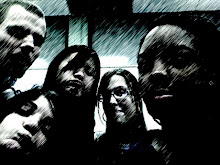Chapter 1
Don't judge people because they may not have had the opportunities as you
Nick grew up in the Midwest where his family was well-off. His prior generations owned a hardware store that has been successful for generations. Nick attended New Haven college in Yale University (his father's Alma mater)and fought in WWI. Nonetheless, he went to the East, New York, to become rich in stocks and bonds. He lived in the less-fashionable West Egg, next to Gatsby's fabulous mansion.
Nick some how gets in contact with his second cousin (once removed) named Daisy Buchanan,her macho husband Tom Buchanan and meets pro-golf player Jordan Baker. Tom is very insecure despite his physical masculinity and his extreme wealth. It is obvious to everyone that he is cheating, because the woman calls his house.
Gatsby is a loner it seems as he stands on his property looking solemnly at the green light at sea...what was that light that seemed to have entranced Gatsby?
Chapter 2
Nick and Tom are riding on a train and Tom forces Nick to see his mistress. It turns out his mistress is also married, her name is Ms. Wilson. Her husband has an almost subservient attitude towards his wife.
Later when they reach the Morningside apartments that Tom had for her when they had their affair. Nick met Ms. Wilson's sister and a party soon begins; after much drinking and several guest arrive the woman talk of their love interest and How Ms. Wilson cannot stand her husband.
The party ends with Tom breaking Ms. Wilson's nose because she kept speaking of his wife, and the guest found their way out after that scene.
I'm surprised on how Mr. Wilson acts toward his wife, he acts like he is in a daze, he must know that his wife is cheating...or maybe he doesn't care.
Catherine says that Tom has been Ms. Wilson's first sweetheart in years- they talk awfully casual about the affair going on...but maybe its because they are drunk
What is the significance of Dr. J. T. Eckleburg?
Chapter 3

Gatsby sent his chauffeur to Nick's home to invite him to his "little party". Nick describes Gatsby's immense wealth and living conditions: Rolls Royce, orchestras, opera singers, rich food, drink and other entertainment.
I know the man is wealthy, but how much wealth does he have, so that he can call a party with orchestras,opera and extreme entertainment
little?
What I found strange was that most of the people invited themselves; perhaps the party would have been little. For "high-class" people, party-crashing seems uncouth. Additionally, most of the people at the party didn't even know who the host was and people made rumors about aspects in his life (he killed a man, was a German spy etc.)
Gatsby knew Nick from the war but Nick really couldn't remember him. Nick also got closer to Baker and at one point thought he had feelings for her, but he found out the she was dishonest (he didn't care too much about that aspect)
Gatsby invited Nick to go out with him on his hydroplane....what is that anyway, a boat?
How could Gatsby remember Nick, they weren't even in the same battalion?
Something is strange/ different about Gatsby, why doesn't he talk about his past?
Why does he throw such big parties, it seems as if he's frivolous with his fortune?
I felt pitied Gatsby, because it seemed to me that even amongst all of that land and money, he was lonely ...or maybe he's just fine with the party crashers and the rumors and he enjoys life.
Why did Gatsby want to talk to Jordan Baker in private...why does he favor her, what did they talk about?
I noticed that there are many drunks in that time, especially among the upper-class, I find it strange that many so-called 'dignified' people were constantly drunk and rowdy at parties.


